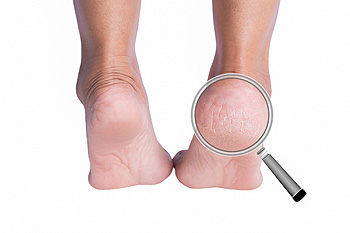
Cracked heels are a common foot condition characterized by the splitting of dry, thick skin on the heels. When only the outer layer of skin is affected, it may not be painful but can be uncomfortable. In more severe cases, the cracks can extend into the healthy skin, causing pain, bleeding, and infection risk. Several factors contribute to cracked heels, including prolonged standing, wearing unsupportive footwear, and biomechanical issues. Additionally, taking hot showers, increase in weight, and medical conditions such as diabetes may contribute to developing cracked heels. They are often more prevalent in the summer due to wearing open-back shoes and warm weather. Symptoms of cracked heels often include discomfort, pain while standing, itchiness, and dry, white skin on the heels. Treatment involves removing the dry skin, addressing underlying problems or infections, and preventing recurrence. Prevention strategies include regular callus removal, daily moisturizing, and wearing appropriate footwear. If you are suffering from cracked heels and they are not responding to everyday foot care, it is suggested that you consult a podiatrist for a specialized treatment plan.
Cracked heels are unsightly and can cause further damage to your shoes and feet. If you have any concerns, contact one of our podiatrists from Barry University Foot and Ankle Institute. Our doctors can provide the care you need to keep you pain-free and on your feet.
Cracked Heels
Cracked heels appear unappealing and can make it harder for you walk around in sandals. Aside from looking unpleasant, cracked heels can also tear stockings, socks, and wear out your shoes. There are several methods to help restore a cracked heel and prevent further damage.
How Do You Get Them?
Dry skin is the number one culprit in creating cracked heels. Many athletes, walkers, joggers, and even swimmers suffer from cracked heels. Age and skin oil production play a role to getting cracked heels as well.
Promote Healing
Over the counter medicines can help, especially for those that need instant relief or who suffer from chronic dry feet.
Wear Socks – Wearing socks with medicated creams helps lock in moisture.
Moisturizers – Applying both day and night will help alleviate dryness which causes cracking.
Pumice Stones – These exfoliate and remove dead skin, which allows for smoother moisturizer application and better absorption into the skin.
Change in Diet
Eating healthy with a well-balanced diet will give the skin a fresh and radiant look. Your body responds to the kinds of food you ingest. Omega-3 fatty acids and zinc supplements can also revitalize skin tissue.
Most importantly, seek professional help if unsure how to proceed in treating cracked heels. A podiatrist will help you with any questions or information needed.
If you have any questions, please feel free to contact our offices located in Miami, North Miami Beach, Miami Beach, and Tamarac, FL . We offer the newest diagnostic and treatment technologies for all your foot care needs.
